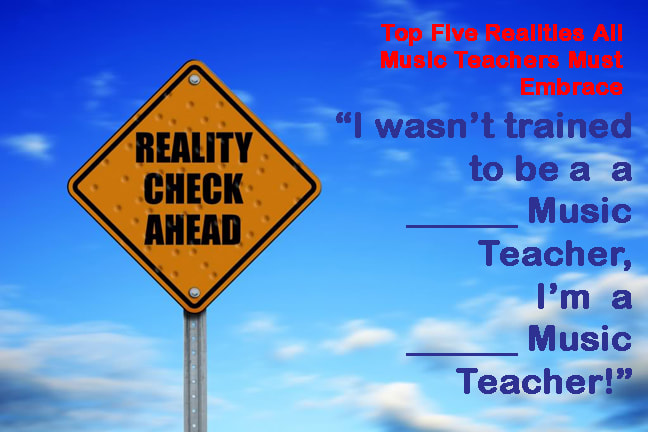First things first.
Congratulations, you are – or are soon to be - a music teacher!
Not many people can say that. The world at large looks at you and assumes that when you hear someone say, “Hey, music teacher” and you turn to look that you must be a music teacher that teaches music.
Is that too much of a stretch?
Reality check: Administrators don't see you as a chorus or an instrumental or a general music teacher. They don't see you as an elementary, junior high, or high school music teacher. They see you as a teacher of music.
In the immortal words of my father, “Do you need a straw because I think it's time that you suck it up”.
No one really cares – except you.
Not only do administrators expect you to be able to teach “soup-to-nuts” music to all ages, they expect you to do it flawlessly with no issues of discipline in your classroom. While it's always important to build on your strengths, administrators don't see it that way. They think your strengths are already developed when you show up.
I always wanted to be a music teacher that could fit into any music teaching situation. I wanted my gig bag to look like MacGyver's, ready for anything musical that a school could throw at me.
I graduated from college hoping to teach in college.
First gig? Teaching four to nine-year-olds. No problem.
Teach guitar?
Of course, yes, he said as he went to the pawn shop to buy a guitar to learn how to play.
Teach piano? Play piano?
Me: Just listen to the songs I've written for the kids to sing.
Admin to me: Incredible! Let's make a recording, a record, sell it, AND MAKE MONEY FOR THE SCHOOL!”
And then I was fired, with a side helping of divorce and all-you-can-carry debt. More on that later.
Even though I was at the top of my game in music, at this point in my life, I was emotionally and financially fragmented.
My next job was at a school for kids with severe and chronic orthopedic and cognitive disabilities. I had a ton of music therapy homework to do. Thankfully, I hit this job at a point in my life where I was not only finally understanding what life was about: I was able to live it and put my beliefs into motion.
I was now teaching music in a public school district in a school where every day was a soul-crushing reminder that we don't always get to pick our circumstances in life.
Every day, my guitar and I drove to multiple schools including Christiana Hospital’s “First State School”. It was only in my last two years of teaching that I was finally in one school every day of the week.
In every music department meeting that dissolved into petty gripes about “I’m not a chorus teacher, I’m a band music teacher!”, or “I’m not a band teacher, I’m a chorus teacher!”, or “I’m not a piano player, I’m trumpet player!”, and a million variations on said complaint, I had to silently frame the whining in the context of my entire student body who didn’t choose the life they were living but were giving the best they had to offer in my classes. My students had limited choices. My peers had unlimited possibilities.
Hearing professional music teachers complain about not getting the exact music job they wanted always made me picture a lunatic cafeteria lady screaming,
“I don’t do hot dogs, only pizza!”
Congratulations, you are – or are soon to be - a music teacher!
Not many people can say that. The world at large looks at you and assumes that when you hear someone say, “Hey, music teacher” and you turn to look that you must be a music teacher that teaches music.
Is that too much of a stretch?
Reality check: Administrators don't see you as a chorus or an instrumental or a general music teacher. They don't see you as an elementary, junior high, or high school music teacher. They see you as a teacher of music.
In the immortal words of my father, “Do you need a straw because I think it's time that you suck it up”.
No one really cares – except you.
Not only do administrators expect you to be able to teach “soup-to-nuts” music to all ages, they expect you to do it flawlessly with no issues of discipline in your classroom. While it's always important to build on your strengths, administrators don't see it that way. They think your strengths are already developed when you show up.
I always wanted to be a music teacher that could fit into any music teaching situation. I wanted my gig bag to look like MacGyver's, ready for anything musical that a school could throw at me.
I graduated from college hoping to teach in college.
First gig? Teaching four to nine-year-olds. No problem.
Teach guitar?
Of course, yes, he said as he went to the pawn shop to buy a guitar to learn how to play.
Teach piano? Play piano?
Me: Just listen to the songs I've written for the kids to sing.
Admin to me: Incredible! Let's make a recording, a record, sell it, AND MAKE MONEY FOR THE SCHOOL!”
And then I was fired, with a side helping of divorce and all-you-can-carry debt. More on that later.
Even though I was at the top of my game in music, at this point in my life, I was emotionally and financially fragmented.
My next job was at a school for kids with severe and chronic orthopedic and cognitive disabilities. I had a ton of music therapy homework to do. Thankfully, I hit this job at a point in my life where I was not only finally understanding what life was about: I was able to live it and put my beliefs into motion.
I was now teaching music in a public school district in a school where every day was a soul-crushing reminder that we don't always get to pick our circumstances in life.
Every day, my guitar and I drove to multiple schools including Christiana Hospital’s “First State School”. It was only in my last two years of teaching that I was finally in one school every day of the week.
In every music department meeting that dissolved into petty gripes about “I’m not a chorus teacher, I’m a band music teacher!”, or “I’m not a band teacher, I’m a chorus teacher!”, or “I’m not a piano player, I’m trumpet player!”, and a million variations on said complaint, I had to silently frame the whining in the context of my entire student body who didn’t choose the life they were living but were giving the best they had to offer in my classes. My students had limited choices. My peers had unlimited possibilities.
Hearing professional music teachers complain about not getting the exact music job they wanted always made me picture a lunatic cafeteria lady screaming,
“I don’t do hot dogs, only pizza!”
Really? Tell me more.
If any of your college instructors gave you the impression that it is a lock that you will get your dream gig, a perfect placement, and that you will teach happily ever after, they lied to you.
If they didn’t address this issue while you were an undergraduate, it was a lie of omission.
And if they told you that you could be offered any music position and you chose not to hear or believe that, then it is on you, not them.
Any day that I could say I was a music teacher, even during the worst of circumstances, was a day that worked for me.
In the immortal words of Peter Hill, ”You picked the ax. Cut the wood.”
If you wanted to teach music then teach music. Don’t let a preconceived notion of what “teaching music” actually slow your progress or stunt your professional growth.
Embrace change – and be thankful you can make music.
Think of the MILLIONS of people who wish they could do what you do.
If none of this works for you, there are other options you may pursue.
If any of your college instructors gave you the impression that it is a lock that you will get your dream gig, a perfect placement, and that you will teach happily ever after, they lied to you.
If they didn’t address this issue while you were an undergraduate, it was a lie of omission.
And if they told you that you could be offered any music position and you chose not to hear or believe that, then it is on you, not them.
Any day that I could say I was a music teacher, even during the worst of circumstances, was a day that worked for me.
In the immortal words of Peter Hill, ”You picked the ax. Cut the wood.”
If you wanted to teach music then teach music. Don’t let a preconceived notion of what “teaching music” actually slow your progress or stunt your professional growth.
Embrace change – and be thankful you can make music.
Think of the MILLIONS of people who wish they could do what you do.
If none of this works for you, there are other options you may pursue.


 RSS Feed
RSS Feed